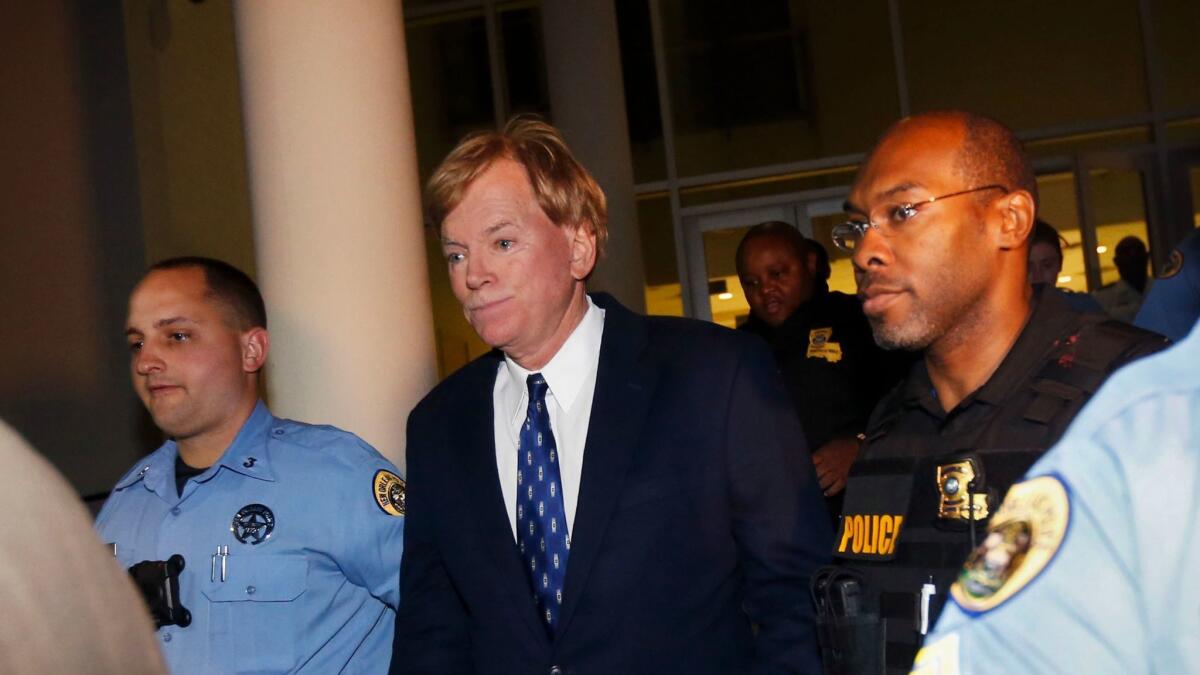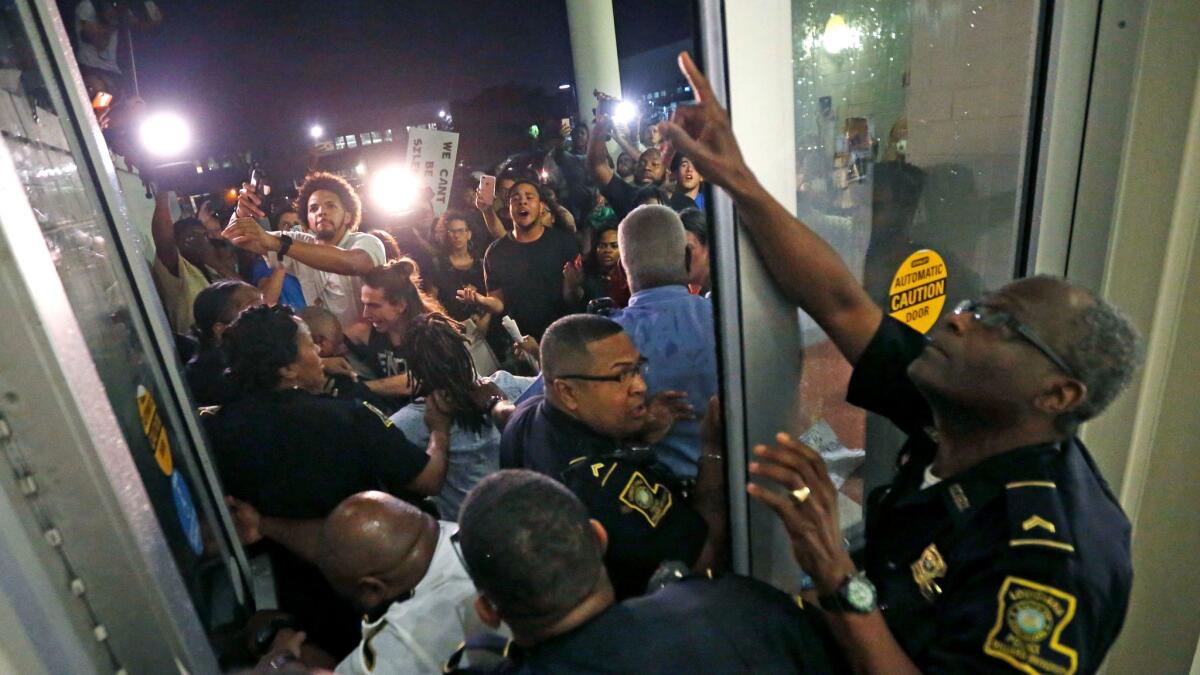A U.S. Senate debate in Louisiana turns ugly, with David Duke at its center

- Share via
Reporting from Atlanta — David Duke, the former grand wizard of the Ku Klux Klan who is running for a U.S. Senate seat in Louisiana, became the focal point of an ugly election debate Wednesday night. He insisted that the political system is rigged, that Black Lives Matter activists are “destroying America,” and that Hillary Clinton should be “getting the electric chair.”
A crowd of more than 50 activists, many of them students, protested the former KKK leader’s presence at the debate at Dillard University, a historically black college in New Orleans. Police used pepper spray to contain the crowd, who chanted “Let us in!” as protesters tried to force their way into the auditorium.
The debate between six U.S. Senate candidates had barely started when Caroline Fayard, a New Orleans lawyer and Democratic candidate, referred to Duke as a “bad man” and expressed dismay that he was on the panel.
“This snake has slithered out of the swamp, probably because the career politicians on this stage haven’t done their jobs effectively enough,” she said. “On Nov. 8, voters of Louisiana are going to join with me and cut the head off his hatred once and for all.”
When Duke announced in July that he was running for U.S. Senate — a day after Donald Trump formally accepted the Republican presidential nomination — critics voiced fear that Trump’s rhetoric on immigration was emboldening right-wing extremists.
Many criticized Trump for not immediately distancing himself from Duke back in February when the former felon and Holocaust denier endorsed him for president. While Trump eventually disavowed Duke’s support, Duke continues to try to align himself with the Republican presidential candidate, echoing his complaints of a political system dominated by elites, as well as his strident criticism of Clinton.
“The lady should be getting the electric chair, being charged with treason,” Duke said of Clinton during Wednesday’s debate.
When quizzed by the moderator, John Snell, about a past reference to “CNN Jews,” Duke said America had a problem with “a very strong, powerful tribal group that dominates our media and dominates our international banking.”
He also railed against black protesters, including the ones demonstrating outside against his presence. “The Black Lives Matter movement calls for the murder of police officers and says death to police and kill the police,” he said. “I defend our country from these radicals who are destroying America. It is time we stand up now. This is the tipping point. We’re getting outnumbered and outvoted in our own nation.”

After the debate, many political analysts voiced skepticism about the decision to let Duke participate.
“Did he have any right being on that stage? Absolutely not,” said Joshua Stockley, associate professor of political science at the University of Louisiana at Monroe, who called Duke a marginal figure. “I think it was a tremendous mistake and he should never have received an invitation. By any reasonable criteria, one could have made a sound, defensible and logical argument to exclude him. His fundraising totals and polling numbers have been negligible. He has not gained any traction.”
The 66-year-old white supremacist narrowly reached the 5% polling threshold for participating. Yet Pearson Cross, an associate professor of political science at University of Louisiana at Lafayette, noted that the poll was paid for by Raycom Media, the broadcasting company that co-sponsored the debate, and that Duke had scored far lower — with around 2% of the vote — in another independent poll in October.
“He’s a disruptive element,” Cross said. “It really doesn’t do anything, in my view, to expand the circle of conversation to bring an avowed racist to a historically black college.”
As the debate got underway, moderator John Snell cautioned the panel about making Duke the focus of discussion. “It would be an enormous disservice to the voters and to the candidates if this becomes a referendum on one candidate,” he argued.
Yet almost everyone on the panel took pains to distance themselves from Duke. The front-runner, Republican state Treasurer John Kennedy, called Duke a “convicted liar,” adding that it “must be terrible to wake up in the morning with that much hate in your heart.” Foster Campbell, a Democrat, decried a rival candidate’s claim that he had links with Duke as a “damn lie,” saying he had nothing in common with Duke, “other than we’re probably breathing.”
After Kennedy brought up Duke’s prison record — in 2002, the former KKK leader served a year in jail after he was convicted of tax evasion and mail fraud — Duke countered that he was “targeted by the government.” When the moderator interrupted him to clarify the facts, Duke repeatedly questioned his objectivity.
“Let me rebut! Let me rebut!” Duke screamed. “See you’re not a moderator. You’re a typical media hack! Are you going to silence me? You’re going to prevent me from answering this question because you want to make a point?”
Duke’s efforts to capitalize on Trump’s claims that the 2016 elections are rigged were unlikely to resonate with Louisianans, Stockley said. Duke was a discredited figure, he argued, who had languished in the margins of political life in the years since he was elected in 1989 to the Louisiana House for one term.
“I had a class this morning and everyone was talking about Game 7 of the World Series or the national presidential election,” Stockley said. “David Duke has long ceased to be a relevant player in Louisiana or anywhere else.”
More to Read
Sign up for Essential California
The most important California stories and recommendations in your inbox every morning.
You may occasionally receive promotional content from the Los Angeles Times.














